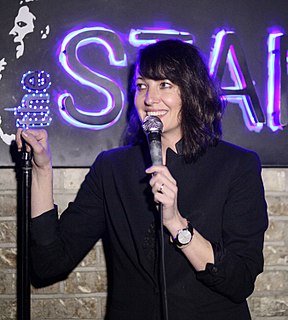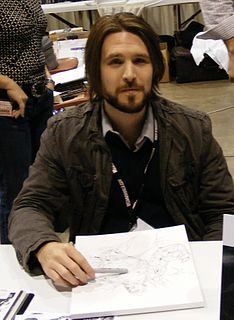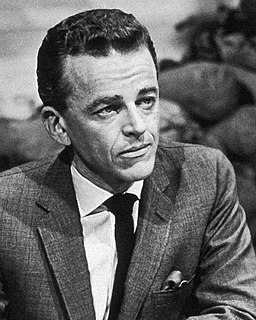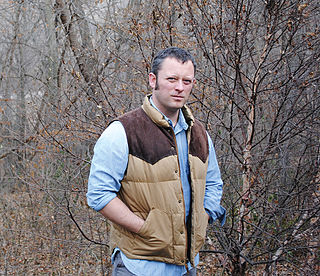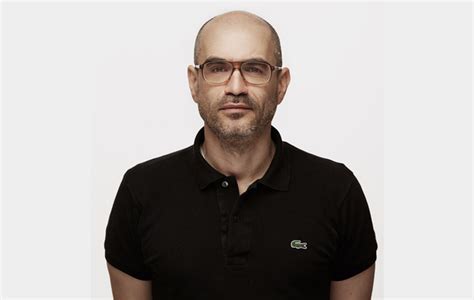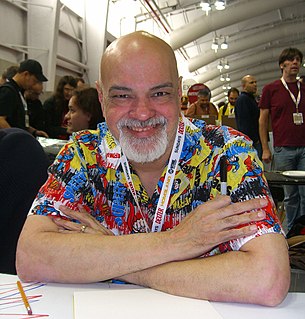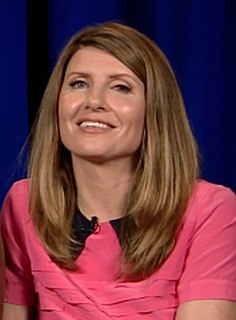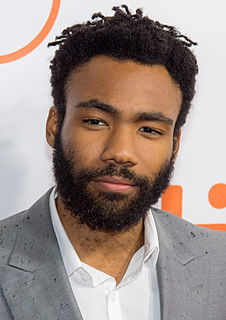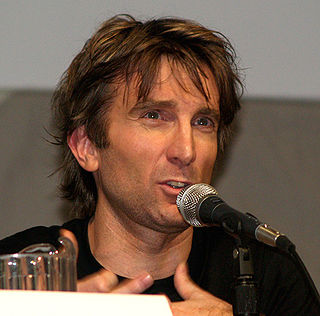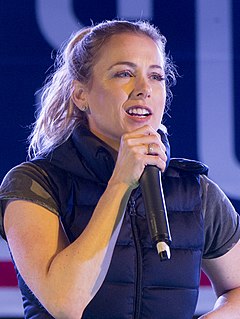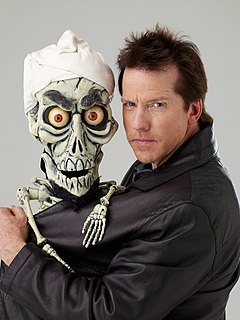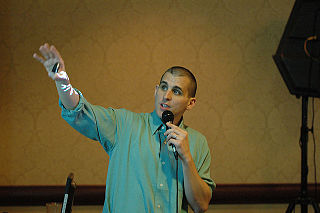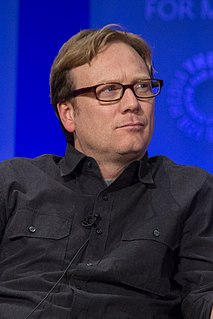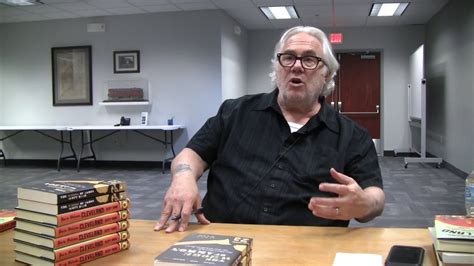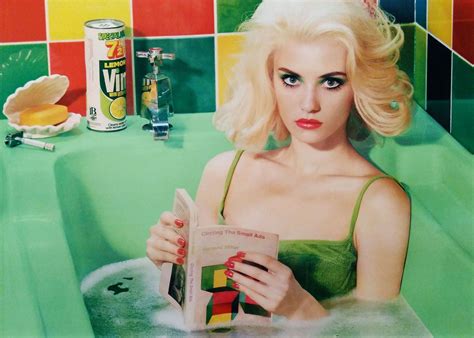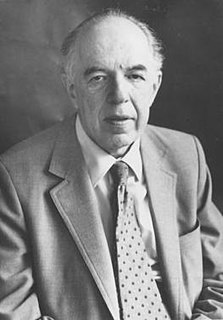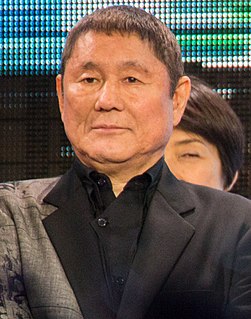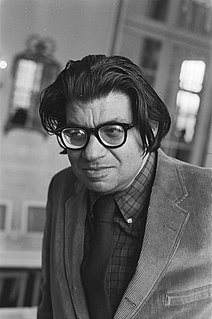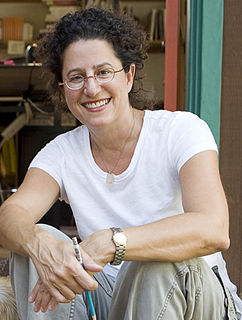Top 239 Sketches Quotes & Sayings - Page 4
Explore popular Sketches quotes.
Last updated on April 23, 2025.
'A Fair Maiden' existed in notes and sketches for perhaps a year. When I traveled, I would take along with me my folder of notes - 'ideas for stories.' Eventually, I began to write it and wrote it fairly swiftly - in perhaps two months of fairly intense writing and rewriting. Most of my time writing is really re-writing.
Monty Python never directly said, 'We're liberals' - they just did their sketches, and you had to figure it out. Generally, they were anti-establishment, of course, making fun of the people in power. I think, comedians, that's their job - pointing out what other people might not notice and going, 'Yoo-hoo, over here.'
One of my favorite sketches, and a popular comedy formula, is to put someone with a mental handicap in some kind of unlikely situation. For example: The retarded gynecologist, the retarded Jesus, the retarded Osama Bin Laden. It works. It's funny. Inappropriate? I dunno. I feel like I'm a pretty good judge of what crosses the line of good taste being that I am retarded. Socially perhaps, but severly retarded.
Mindi Scott has a real talent for getting inside her protagonist's head. She sketches out Coley's story in grand swathes, and then paints in all the little details, so that you feel as though you are enmeshed in Coley's brain: thinking her thoughts, feeling her confusion, anger, and, in the end, pain. I just don't think it's possible to read this book and not identify with Coley in some way.
In Comme des Garçons, I hardly do any sketches; there's no fittings on bodies, there's no models that come in and say, "Oh, a little bit like this." In the beginning, there isn't even a theme. It's like getting the whole world at your feet - to empty your mind of everything that's ever happened before, to get an empty space.
There is force and vitality in a first sketch from life which the after-work rarely has... In your sketches keep the first vivid impression! Add no details that shall weaken it! Look first for the big things! 1st. Proportions! 2nd. Values - or masses of light and shade. 3rd. Details that will not spoil the beginnings!
Simon's walls were covered in what looked like pages ripped from a comic book, but when I squinted, I realized they were hand drawn. Some were black-and-white, but most were in full color, everything from character sketches to splash panels to full pages, done in a style that wasn't quite manga, wasn't quite comic book.
Color is definitely an important factor for me during all phases of producing a cover. I always start out with a loose idea of what I want to see when I'm doing my initial sketches. This choice can be informed by anything, but I usually tend to lean toward more simple color schemes... something with a very obvious push between warms and cools.
The more you create, the more ambitious you become with your projects. Short films were a direct result of over 200 web series sketches and vlogs. After you create enough 2-minute videos, you start to wonder what else there is. Deadlines and discipline and quantity with a focus on quality have always been what keeps me going.
Longevity in my family's been pretty good. And my grandparents were pretty spry at their age, so I figured I'd probably stay skinny and fairly agile. I used to do old men all the time in sketches. And there used to be an organization called the Gray Panthers. And they would send me, oh, terrible letters about making fun of old people. And I would just always say, "I'm playing the old person I intend to become!"
Before seeing Truffaut 's Small Change, I was afraid it was going to be one of those simple, natural films about childhood which I generally try to avoid I'm just not good enough to go to them. But this series of sketches on the general theme of the resilience of children turns out to be that rarity a poetic comedy that's really funny.
The old Johnny Carson 'Tonight Show' was great in that he was so good with the guests, and it was not about him. I think he was very smart in realizing 'I have plenty of screentime on this show. I do my monologue and we do sketches and stuff like that.' During the interview, he really made it about trying to bring the best thing out of the guest.
I always wanted to write, even before I realized that there was a comedy writers' world, or what that life was like. I never thought of myself, at least as a little kid, in terms of being the onscreen talent. I always thought it'd be so much fun to write sketches and be a writer. Even as little as 6 or 7, that's what my main interest was.
Theodor Geisel (otherwise known as Dr. Seuss) spent his workdays ensconced in his private studio, the walls lined with sketches and drawings, in a bell-tower outside his La Jolla, California, house. Geisel was a much more quiet man than his jocular rhymes suggest. He rarely ventured out in public to meet his young readership, fretting that kids would expect a merry, outspoken, Cat in the Hat–like figure, and would be disappointed with his reserved personality. “In mass, [children] terrify me,” he admitted.
I have a scenario but almost always it's entwined with at least one person to begin with. Then I sort of expand from there and I'm thinking about books novels. I've got these scrolls of paper that I hang up in my office and this is my idea room, my nightmare factory, and I have a big title at the top of the scroll and on the left hand side I have these character sketches on the characters, and then once I figure out who they are I can figure out what they want and once I figure out what they want I'm able to put obstacles in the way of that desire, and that's where plot springs from.
With theatre, you can interpret the most complex play on stage for it have meaning to an audience because you're dealing in images, you're dealing in action, you can use different idioms to interpret and clarify something which is obscured in the reading and of course there are different kinds of play, there are mythological plays, there are what I call the dramatic sketches, direct political theatre which is virtually everybody, but I find that you can use the stage as a social vehicle, you know, which any kind of audience.
That and when you're doing live action you don't normally get to see the thing before it's in production. In this case we'd go in every couple weeks and look at animatic and sketches. The way they do it - is they'll put it up on a screen and the storyboard artist who worked on that sequence will talk you through it. Kind of like a pitch session. Then they would leave and we would sit there with the directors and say 'Alright - what if we change that? What if we do that?' It's very different from live action.
I don't miss anything ever. Because to me, missing something is like going backward a little bit. I don't miss being in a punk band. For me, 'SNL' is like... this is gonna sound overly dramatic, but... the way I am, it feels like I'm a soldier, so it was like, 'What do you want me to do? Put me anywhere. Do you want me to do these sketches? Great.'
I never feel a huge need for backstory in my novels or films. Quick sketches are often enough. When you encounter people in life - like a chance encounter at a bar or wherever you happen to be - you make these incredibly quick, quite intricate decisions about people based on very small amounts of coded information. We're good at that. Long descriptions prior to meeting someone or as you're getting to know them almost don't work.
The space that I can call mine.. is so small that my ideas have become small. I am like a caterpillar in a cocoon of paper; all around me are sketches for sculptures, small drawings that seem like moths fluttering against the windows, beating their wings to escape from this tiny space.. Every day the ideas come more reluctantly, as though they know I will starve them and stunt their growth.
I love dipping into worlds at a fast and furious pace. A little glimpse allows the audience to put together the rest of that world in their brain. I love sketches that require the audience to piece together the comedic engine themselves. Give them all the information but not tell them what the scene is about so they can have that eureka moment of, "Oh my God, he's only used to the way urban students pronounce their names. That's what's going on here.".
The general ideas which are expressed in sketches, correspond very well to the art often used in poetry... every reader making out the detail according to his own particular imagination... but a painter, when he represents Eve on canvas, is obliged to give a determined form, and his own idea of beauty distinctly expressed.
I love comedy. I suppose comedy is my first love, in a way. I did a lot of acting, funnily enough, unprofessionally, as a kid. From when I was 10 years old until I was about 19, I was always doing little sketches with my friends, and doing different accents and voices. Probably about 3/4 of those were comedic, in some way, and the other 1/4 was more serious stuff or more action or more dramatic little pieces that I would make. But, I tend to lean towards comedy.
I've been sort of writing sketches for songs on my own forever and putting them down on cassette tapes. Yet for years and years and years, my main songwriting outlet was as a member of Sonic Youth, and for most of our time together, our best songs were written in a group setting, where the four of us were getting together in a room.
In 2001, the hard disk on my laptop crashed, and everything on it was lost. I'd been using the computer for two, almost three years, and had all my work on it - email, which was stored locally; photos; fragments of poems; presentations; sketches; ideas; love letters; everything. I lamented the loss to my friends and got lectured on doing backups.
Just by nature, I think in comedy. I think in sketches and what have you. In every drama or action movie I've been in, I have to make a concerted effort not to turn it into a comedy. Every shot, before action is called and after cut is called, I'm usually in some goofy head space. It feels natural to me.
For the most part, my characters don't talk to me. I like to lord over them like some kind of benevolent deity. And, for the most part, my characters go along with it. I write intense character sketches and long, play-like conversations between me and them, but they stay out of the book writing itself.
I've got the luxury of being able to work largely alone, so I don't need to communicate difficult creative classeas to other people and can leave the whole thing in my head or on scattered notes and sketches that only I need to understand. So I can very radically and quickly change things as I go without tripping anybody else up. And the camera allows me to experiment and try new things on the fly.
Erasmus dramatizes a well-established political position: that of the fool who claims license to criticize all and sundry without reprisal, since his madness defines him as not fully a person and therefore not a political being with political desires and ambitions. The Praise of Folly, therefore sketches the possibility of a position for the critic of the scene of political rivalry, a position not simply impartial between the rivals but also, by self-definition, off the stage of rivalry altogether.
Lord Maccon asked meekly, shifting against her in a manner that ensured she realized the nibbling had affected his outsides just as much as her insides. Alexia was partly shocked, partly intrigued by the idea that as he was naked, she might actually get to see what he looked like. She had seen sketches of the nude male, of course, for purely technical purposes. She was given to wonder if werewolves were anatomically bigger in certain areas.
Carrying a small notebook with you always, in your pocket or purse, along with a reliable ballpoint pen will enable you to jot down spot observations and quick character sketches before the first sharp impressions fade away. You'll need all kinds of story actors, because even picture books can include a wide range of ages, relationships, occupations, and nationalities. Learn to observe and analyze swiftly, wherever you are.
All great tasks test our motivation. It's easy to court ideas over beers and change the world with napkin sketches, but like most things taken home from bars, new challenges arise the next day. It's in the morning light when work begins, and grand ideas (or barroom conquests) lose their luster. To do interesting things requires work and it's no surprise we abandon demanding passions for simpler, easier, more predictable things.
I think I'm one of those guys who was sort of always in comedy. I thought of myself - and other people seemed to think of me - as funny from a very young age. I was a very young comedy nerd and I even did sketch comedy in high school and college. I wrote and shot sketches on video and acted in them.
I remember when I had my show [The Chris Rock Show on HBO], I used to run my show. It was so hard to get people to bring sketches to me. No one had ever worked for a black person before. Even the black people hadn't worked for a black person. It literally took a month or two for everybody to know: I'm really running the show.
I like the drawings. And as a photography fan myself, I would look at Helmut Newton or Irving Penn and like to see the initial notes or drawings, to see where the ideas grew from. Also my sketches are key to my work because I came to realise early on that by doing drawings, I could formulate a plan of what I was thinking of - I could take control and direct the work.
Doing TV shows helps me a lot in my screenplay writing and filmmaking, especially since my TV shows are in different formats: comedy sketches, talk shows, debate programs, art variety shows, quiz shows. These enable me to meet interesting people with interesting stories and to learn about interesting subjects, all of which I can reflect into film.
I have a very dear friend, a great painter, called me up very upset, the work wasn’t going well… He asked me to come to his studio -- which I did -- I looked around at the work, dozens of sketches, drawings, large pictures, and I was very close to his work, intensely involved with his work, and he asked me, ‘What’s wrong?’ And I said, ‘Simple – it’s a loss of nerve.
But my motivation was more a matter of wanting to create order - to keep track of things. All those boxes full of photographs and sketches weigh you down, because they have something unfinished, incomplete, about them. So it's better to present the usable material in an orderly fashion and throw the other stuff away. That's how the Atlas came to be, and I exhibited it a few times.
What I had to do was learn how to tell stories with my pictures. At first I didn't even know what that meant because I thought I was already doing it. After all these years of drawing stories and trying to teach it, I think it boils down to a pretty simple rule: it takes time to get to know the characters in a book and the world they inhabit. My first sketches are always horrible. Stereotypical. Contrived. Generic. I have to put in the time in order to deepen them and have it all mean something.
Many books that you read, they have those disclaimers that say that, "None of the events and none of the people are based on real life" and so on... Well, I don't believe that. I think that as human beings many people touch us, especially people we love the most and we can't help but do character sketches when we go to our art.
The abstract, especially in those rough sketches, is very important to me, perhaps because of my advertising background, where layout is so important. Sometimes those first few lines cut the paper into such satisfying shapes that I don't want to go on, but I always do, adding nostrils and nipples and bootstraps until I have filled the paper up as usual.
A comparably capacious embrace of beauty and pleasure - an embrace that somehow extends to death as well as life, to dissolution as well as creation - characterizes Montaigne's restless reflections on matter in motion, Cervantes's chronicle of his mad knight, Michelangelo's depiction of flayed skin, Leonardo's sketches of whirlpools, Caravaggio's loving attention to the dirty soles of Christ's feet.
Even when I go shopping, I don't shop as a woman. The only time I shop is when I need something, and I'm in and out in less than 30 minutes, so I have no energy to look at 50 million gowns and styles and make sketches and think about heels. I'm not girly in that way. I'm relying on the stylist to do 99 percent of the work.




